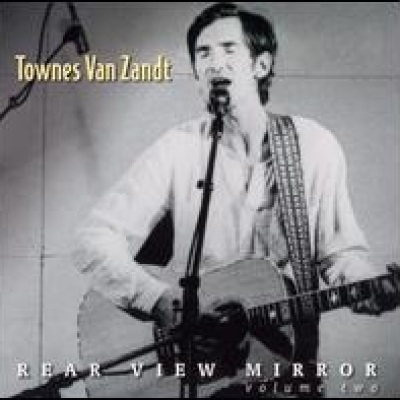
Rear View Mirror, Vol. 2
by Thom Jurek The first volume of Rear View Mirror, which had appeared as an import in 1993, was released domestically on January 2, 1997, the day after Townes Van Zandt passed away. Recorded with a small band when he was in top form in the late '70s, Rear View Mirror was a hard pill to swallow in that it showcased in spades exactly who it was we had lost. This collection, compiled by Van Zandt before his death along with his manager/business partner, Harold Eggers, features the same band, though it is compiled from various performances between 1976 and 1979 and many of the songs are preformed solo. What is so startlingly revelatory about Van Zandt is that, like Bob Dylan, one can hear the depth and measure of the artist not only in his own material but in the performances of the songs he covers. And there are plenty of them in this bevy of 18 tracks. The set opens with a stomping folk-blues read of Bo Diddley's "Who Do You Love," turned inside out and retaining all of its swampy forbidden sexuality. In this version, with a woolly, devilish fiddle by Owen Cody, the spookiness in the lyric comes to the fore. The brief "Greensboro Woman" here is dignified, and contains all of the outsider tenderness that was Van Zandt's to dispense. The cipher in the set comes early in the medley of "Brand New Companion" with the traditional "Cocaine Blues." There is something utterly eerie in the combination of these two blues tunes. The latter is given a new, ominous meaning by the latter's proximity and added meaning. There are certain performances here that, while wonderful aesthetically, are of poor sonic quality -- "None But the Rain," with its cassette tape hiss and stage buzz, is a case in point. The version of Lightnin' Hopkins' "Hello Central" offers a wide, multi-dimensional portrait of Van Zandt as a folk-bluesman of the highest order as well. The version of "Loretta" here is simply one of his finest on tape and distills forever the portrait of its subject, and "Snowin' on Raton," bookended here by "No Deal" and "Tecumseh Valley," is alone worth the price of the disc. The version of "Coo Coo" here -- wrongfully credited to Van Zandt -- is one of the better reads of the song to come after Roscoe Holcomb's, without question. It's elliptical, troubling, ponderous, and full of edgy mystery. In sum, while this set is a little more erratic sonically, it is without a doubt a fitting and necessary companion to its predecessor.
